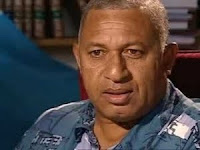Cartoon: Goofy Green Monster with Spots, Six Legs and One Eye. Clip Art.
The story posted by the anti-government blogger Coupfourpointfive under the heading "Any Negativity Against Regime Treated as Treason" is factually incorrect and, one must assume, deliberately misleading. I consider this the most blatantly biased, damaging -- but most easily refutable -- release so far by Coup4.5. Their general credibility is now in serious doubt.
If the mainstream print and radio media report this blog story without first checking the facts against Fiji's old and new laws, they are a party to the blogger's action, whether intended or not. Sloppy journalism becomes a weapon in politically delicate situations.
Coup 4.5 reports that " one part of the decree limits what the Fiji media can report on a criminal case." The inference is that this is a new provision, limiting freedom of the press. This is not so.The provision of the Criminal Procedure Decree prohibits reporting on criminal cases "until the conclusion of the trial" (section 201). It applies only to offences to be tried before the High Court such as rape and murder. And the provision is identical to section 236 of the repealed Criminal Procedure Code that has been Fiji law since about 1948.
The blog then states: " Under subsection 65 Part 2 individuals and NGO's criticising Frank Bainimarama's regime are deemed to have committed treason and this is punishable by life imprisonment."
In fact, section 65 of the new Decree is section 65 of the old Penal Code, which defined a seditious (sic!) intention as an intention, inter alia, to promote feelings of ill-will and hostility between different classes of the population of Fiji. Section 66 of the old Penal Code created the offence inter alia of "printing, publishing, selling, offering for sale, distributing, or reproducing any seditious publication" which offence was punishable with two years imprisonment and/or a fine of $200 on a first offence and three years on a subsequent conviction.
So the offence in the Decree is not new and arguably blogsites which promote feelings of ill-will and hostility between classes of the population have already been guilty of the old section 66! Only the name and the penalty has changed. The offence is now called "inciting communal antagonism" and the maximum penalty is now 10 years imprisonment. The offence is not called treason.
Treason is a separate offence under section 64 and it re-enacts the old common law definition of treason (as used in the trials of Timoci Silatolu and George Speight). It includes acts of killing the President or the Prime Minister or causing them harm and also includes levying war against Fiji. In fact the new definition adds nothing to the common law definition of treason, nor does it dilute it.
Last year's Abrogation of the 1997 Constitution made it necessary to replace laws existing under the Constitution. For the most part, the decrees that replace them replicate, clarify and update the old laws. No new "draconian" sections have been added.
Readers wishing to read the new Crime Decree and Criminal Procedure Decree may click on these links to Mediafire, and download them from there.
The Media Decree is still being drafted so responsible comment is not yet possible.
Anonymous comments on all posts must include pseudonyms, either in place of Anonymous or as part of the comment. This helps discussion.


















